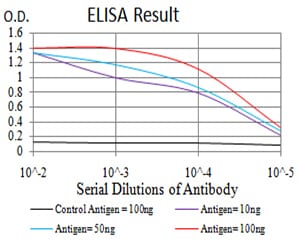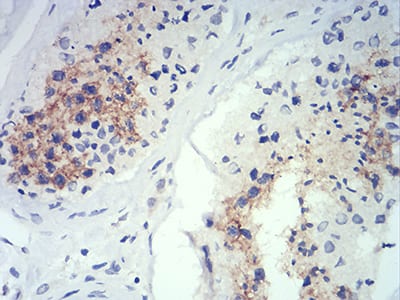

| WB | 咨询技术 | Human,Mouse,Rat |
| IF | 咨询技术 | Human,Mouse,Rat |
| IHC | 1/200 - 1/1000 | Human,Mouse,Rat |
| ICC | 技术咨询 | Human,Mouse,Rat |
| FCM | 咨询技术 | Human,Mouse,Rat |
| Elisa | 1/10000 | Human,Mouse,Rat |
| Aliases | ATG14; BARKOR; KIAA0831 |
| Entrez GeneID | 22863 |
| clone | 1F7C10 |
| WB Predicted band size | 55.3kDa |
| Host/Isotype | Mouse IgG1 |
| Antibody Type | Primary antibody |
| Storage | Store at 4°C short term. Aliquot and store at -20°C long term. Avoid freeze/thaw cycles. |
| Species Reactivity | Human |
| Immunogen | Purified recombinant fragment of human ATG14L (AA: 43-303) expressed in E. Coli. |
| Formulation | Purified antibody in PBS with 0.05% sodium azide |
+ +
以下是关于ATG14L抗体的3篇代表性文献摘要(示例):
1. **文献名称**:*Distinct regulation of autophagic activity by Atg14L and Rubicon associated with Beclin 1–phosphatidylinositol-3-kinase complex*
**作者**:Zhong Y, et al. (2009)
**摘要**:该研究利用ATG14L特异性抗体,揭示ATG14L与BECN1复合体的相互作用,证明其在自噬体形成初期通过促进PI3K活性调控自噬,而Rubicon则抑制此过程。
2. **文献名称**:*Structure of the human ATG14L coiled-coil domain provides insight into the interaction mechanism with VPS34*
**作者**:Lu J, et al. (2019)
**摘要**:通过免疫共沉淀(使用ATG14L抗体)和结构生物学方法,解析了ATG14L的coiled-coil结构域如何介导其与VPS34激酶的互作,阐明其在自噬体膜形成中的分子机制。
3. **文献名称**:*Autophagosome precursor maturation requires functional ATG14L and syntaxin 17*
**作者**:Itakura E, et al. (2012)
**摘要**:研究通过ATG14L抗体阻断实验,发现ATG14L与STX17蛋白协同调控自噬前体膜融合,证明其在自噬体成熟中的必要性。
*注:以上为示例文献,实际引用建议通过PubMed或Google Scholar以“ATG14L antibody”或“ATG14L autophagy”为关键词检索最新论文。*
×